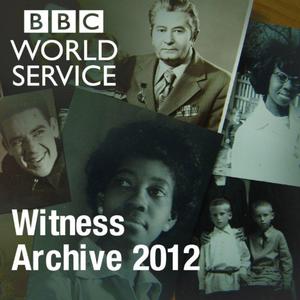
Witness History: Archive 2012
BBC World Service
The story of our times told by the people who were there.
- 8 minutes 59 secondsThe Death of Steve Biko
The anti-Apartheid activist Steve Biko, leader of the Black Consciousness Movement in South Africa, died in a police cell in 1977. The South African police claimed he'd gone on hunger strike and had starved himself to death, but he had only been in prison a matter of days.
Helen Zille was the journalist who helped uncover the truth of his death - that he had in fact died of a brain hemorrhage due to head injuries. The report she published in the Rand Daily Mail showed that the govenment had lied.
(Image: Members of the Socialist Party of Azania (SOPA) hold a candle light memorial ceremony to mark the death anniversary of the anti-apartheid activist and founder of the Black Consciousness Movement Steve Bantu Biko. Credit: RAJESH JANTILAL/AFP/GettyImages)
4 October 2013, 12:00 pm - 9 minutesJohn Howard Griffin: Black Like Me
John Howard Griffin, a white journalist, dyed his skin black to experience segregation in America's Deep South. John Howard Griffin wrote a book about his seven week experience.
*** Listeners should be aware that some of the language in this programme reflects the historical context of the time. ***
Photo: Griffin as a black man in 1959 (left). Courtesy of John Howard Griffin Estate.
3 October 2013, 8:00 am - 9 minutes 1 secondThe Los Angeles Riots
In May 1992 the people of South Central Los Angeles took to the streets in fury at police brutality.
They were angry that Los Angeles police department officers accused of beating a motorist called Rodney King, had been acquitted.
Hear Rodney King's take on the beating, and the unrest and violence that followed it.
2 October 2013, 10:00 am - 8 minutes 57 secondsThe Stolen Generation
Debra Hocking was taken from her indigenous Australian family as a baby and was placed with a foster family. It was part of a government policy to try to assimilate Aboriginal children into white families.
Photo: PM Kevin Rudd prepares to apologise to the Stolen Generation in Parliament on February 13 2008. (Getty Images)
1 October 2013, 6:00 pm - 8 minutes 56 secondsAfrican Troops During WWII
During World War II, African soldiers were a vital part of the Allied forces. Many of them were sent to Burma as reinforcements for the British troops there. Hear just some of their memories - recorded by the BBC in the 1990s.
Find out more about African troops in Burma in Another Man's War: The Story of a Burma Boy in Britain's Forgotten Army, a book by former BBC correspondent Barnaby Phillips, published June 2015.
(Photo: East African soldiers in Burma fighting for Britain in WW2, unknown date. Credit: Topham Picturepoint)
1 October 2013, 12:00 pm - 8 minutes 55 secondsPong and the birth of the computer game
It is 40 years since a video game was invented which would change the way we play. An on screen version of table tennis, to begin with Pong was only played in video arcades. But soon a home version was created which people could plug into their televisions.
Photo credit: BBC.
31 December 2012, 9:58 am - 8 minutes 55 secondsBig Brother - the beginning of reality TV
In December 1999 a young Dutch man won the first ever Big Brother reality TV show.
It was to be the start of a global television phenomenon.
But for 22-year-old Bart Spring in't Veld, his victory proved to be a mixed blessing.
Photo: Big Brother winner Bart Spring in't Veld (Endemol)
28 December 2012, 9:50 am - 9 minutes 11 secondsMaitatsine
In December 1980, thousands were killed in the Nigerian city of Kano following an uprising by an Islamic sect.
The sect was led by a radical preacher, Maitatsine.
We hear from a witness who saw hundreds of suspects summarily executed as the Nigerian state tried to crush the uprising.
Photo: Kano old city wall c. 1975
27 December 2012, 11:20 am - 9 minutes 7 secondsVietnam War - Christmas bombing campaign
40 years ago the Americans launched their heaviest aerial bombardment of the Vietnam War. It was to become known as the Christmas bombing campaign. 20 thousand tonnes of explosives were dropped on or around the Northern city of Hanoi.
Photo: A B52 flying over Vietnam. Credit: VT Freeze Frame.
26 December 2012, 9:50 am - 9 minutes 6 secondsThe Execution of the Ceauşescus
Nicolae and Elena Ceauşescu were executed by firing squad on 25 December 1989.
It was the end of one of the most repressive regimes in former Communist eastern Europe.
Petre Roman took part in the revolution that overthrew the Ceauşescus and became the country's first democratic prime minister.
Photo: Elena and Nicolae Ceauşescu in the November before their execution, Credit: Getty Images
25 December 2012, 9:00 am - 9 minutes 4 secondsDusty Plays South Africa
In 1964 the British popstar Dusty Springfield went on tour in apartheid South Africa. She said she would only play to racially mixed audiences but the authorities didn't approve. She was forced to leave the country before she had finished her tour.
Photo: Dusty in 1964 - BBC.
24 December 2012, 9:50 am - More Episodes? Get the App
Your feedback is valuable to us. Should you encounter any bugs, glitches, lack of functionality or other problems, please email us on [email protected] or join Moon.FM Telegram Group where you can talk directly to the dev team who are happy to answer any queries.